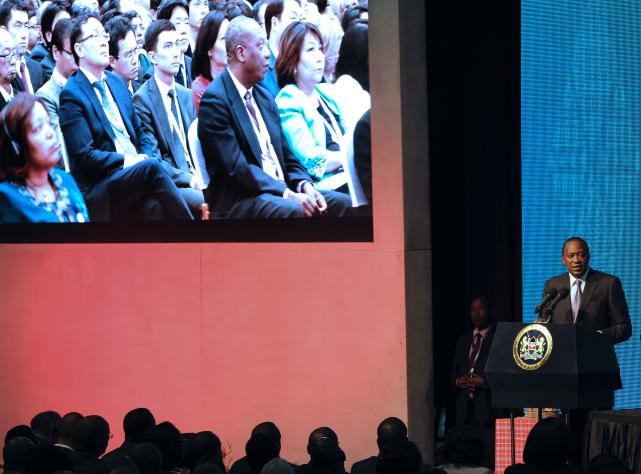Published in The Daily Star on Monday, 21 December 2015
MACRO MIRROR
WTO’s Nairobi Package for LDCs
 The outcome of the Nairobi Ministerial Conference of the World Trade Organisation has received mixed reactions. From very depressing expectations, the WTO members finally made some progress on the Doha Round negotiations, though not exactly the way it should have. Initially set to discuss and reach agreements during December 15-18, 2015, the conference was extended by another day in a bid to show the world that the multilateral trading system is not yet defunct in an advancing global economy. Still, the draft declaration of the tenth WTO Ministerial Conference indicates that there are sharp differences among member countries on a number of critical issues.
The outcome of the Nairobi Ministerial Conference of the World Trade Organisation has received mixed reactions. From very depressing expectations, the WTO members finally made some progress on the Doha Round negotiations, though not exactly the way it should have. Initially set to discuss and reach agreements during December 15-18, 2015, the conference was extended by another day in a bid to show the world that the multilateral trading system is not yet defunct in an advancing global economy. Still, the draft declaration of the tenth WTO Ministerial Conference indicates that there are sharp differences among member countries on a number of critical issues.
Some of the most difficult areas of the Doha Round negotiations, which were initiated in 2001, have been agricultural and non-agricultural market access, reform of domestic support policies in agriculture and market access of services. Demands of least developed countries include duty-free and quota-free market access, preferential rules of origins, operationalisation of the services waiver, and monitoring mechanism on Special and Differential Treatment. Bangladesh, an LDC and the coordinator of the LDC group, has been active in raising its demands during the run-up to the Nairobi conference.
While the decision of the Nairobi Ministerial is yet to be scrutinised in detail, one may have a quick look at what is there for LDCs. In particular, the Nairobi text on rules of origin and services trade carries significance for LDCs and Bangladesh.
The use of simple and transparent rules of origin in trade preferential schemes has been reiterated by LDCs. Even if LDCs are given various preferences, such as generalised system of preferences (GSP), they cannot fully realise preferential market access due to stringent rules of origin. It has been urged that the threshold level of value addition for LDCs should be kept as low as possible so that they can comply with it.
The Nairobi Ministerial’s decision on rules of origin sets a timeframe for preference, granting members the opportunity to undertake the commitments contained in the decision by December 31, 2016. On the value addition threshold, the rules of origin text mentions that the use of materials not originating from an LDC can make up to 75 percent of the final value of a product for it to qualify for preferential treatment. The Nairobi text also calls for the deduction of any costs associated with the transportation and insurance of inputs from other countries to LDCs. Developing countries declaring themselves in a position to do so are also asked to undertake similar commitments.
The decision of allowing 75 percent of non-originating material is also considered to be prohibitive in view of the fact that increasingly global value chains in modern manufacturing sometimes require very little domestic content. Therefore, LDCs may not be able to reap full benefit of the rules of origin agreement.

In case of services, the existing services waiver has been extended until December 31, 2030. This is due to the extended period between the adoption of the waiver in December 2011, and the notification of preferences in 2015. One would recall that on December 17, 2011, during the 8th Ministerial Conference of the WTO in Geneva, LDCs were given services waiver, under which these countries would receive some preferences in case of exports of services. LDCs can gain market access in different sectors and modes of services which are of interest to them. The waiver was to be granted immediately to all LDCs, with preferential treatment being conditional to complying with non-trade issues. The waiver also has the provision of rules of origin which would not allow any other country to be a free rider, i.e. it prohibits other countries to take benefit of preferential access by establishing companies in LDCs. Given LDCs’ weak capacity, members are also requested to provide capacity building and technical support to LDCs so that they can take advantage of the services waiver.
At the previous WTO Ministerial Conference in Bali in 2013, members decided that the Committee on Trade in Services at the WTO would initiate a process for operationalisation of LDCs’ service waiver and review the progress periodically. Developed and developing country members in a position to do so, would indicate “sectors and modes of supply” for providing preferential treatment to LDC services and service providers.
But the operationalisation of the services waiver has been challenging. Therefore, the Nairobi declaration points out that preferences to LDCs should have “commercial value” and “promote economic benefits.” LDCs face market access and national treatment restrictions in case of cross-border movement of professionals. Therefore, flexibilities are required. These include removal of entry barriers, creation of a special temporary entry visa quota for LDCs, removal of restrictions on the category of contractual service suppliers and independent professionals, residency permits, Economic Needs Test and labour market tests and conditions on local. In addition, removal of various non-tariff barriers related to visa, work permits, residency permits and recognition of professional qualifications and accreditations are necessary for operationalisation of the services waiver.
A lot of issues are left to be dealt with in the coming months in Geneva. Therefore, the post-Nairobi landscape will be as difficult as before. This may also have implications for the implementation of other global commitments, such as the Istanbul Plan of Action for LDCs adopted in 2011 and the Post-2015 Sustainable Development Goals by the United Nations in September 2015. How the trade negotiators look at these issues and perform in the WTO discussions will shape the achievements of these global announcements to a large extent.
The writer is Research Director at the Centre for Policy Dialogue.

